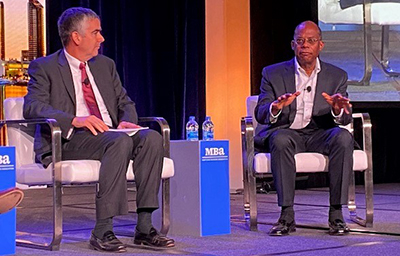
#MBACREF23: Ferguson Sees Mild(er) Recession Ahead

(MBA Chief Economist Mike Fratantoni (l) interviews Roger Ferguson, President & CEO of TIAA, at CREF23.)
SAN DIEGO–Economist, corporate executive and former Federal Reserve Vice Chairman Roger Ferguson thinks any possible recession this year will likely be short and shallow.
“Many CEOs are preparing for a recession, but the number who are preparing for a deep one has really shrunk,” Ferguson, President & CEO of TIAA, said here at the MBA Commercial/Multifamily Finance Convention & Expo 2023. “I’m starting to hear talk about the economy avoiding a recession. But I believe we’ll see a short, shallow recession for now, which is not a bad outcome given how fast the Fed has been raising interest rates.”
Ferguson noted equity markets show cross currents at the moment. “The S&P 500 is heavily weighted toward tech companies that are seeing a lot of layoffs,” he said. “But there are also lots of good companies showing good numbers. We see airlines doing incredibly well, for example. So the market is composed of many different markets with different cross currents.”
Ferguson said a relatively small numbers of companies have generated headlines with small numbers of layoffs. “The layoffs are in the thousands, not the millions,” he said. “There are also pockets where there are labor shortages, especially in the service sector, particularly in the lower tier of service-sector jobs. So, we’re seeing headlines about large companies laying people off, but small- and medium-sized enterprises are hungry for workers.”
Commercial real estate is a cyclical industry, Ferguson noted. “There will be repricing that will allow someone to make a lot of money,” he said. “Also, keep in mind the world has never yet ended, so it’s unlikely to do so soon.”
Some market analysts expect the Fed will cut interest rates later this year, “But I personally don’t believe that,” Ferguson said, adding he expects 30-year mortgage will settle in the 6 to 7 percent range. “The very, very low rates seen in recent years were not the norm; they were a response to an event,” he said. “Money should not be free. And we are getting back to that, I expect.”
